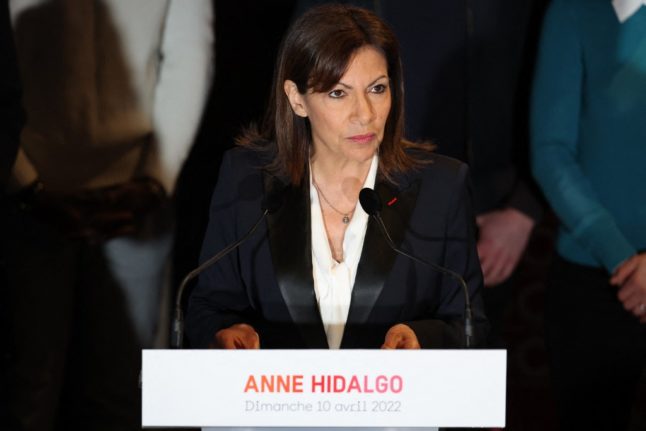With humiliating eliminations from France’s presidential vote on Sunday, the historic rightwing Republicans party joins the Socialists in facing a moment of truth — rebuild a viable political project or risk consignment to the history books.
Republicans candidate Valerie Pecresse finished in fifth place according to projections after failing to woo back voters who turned to centrist upstart Emmanuel Macron or the far right of Marine Le Pen, who both advanced to the April 24 run-off.
The blow was all the more devastating as the Republicans party traces its roots to Charles de Gaulle, the revered World War II Resistance hero who built the foundations of the all-powerful French presidency.
“I had to fight a battle on two fronts, between the president’s party and the extremes that joined forces to divide and beat the republican right,” Pecresse said after her defeat.
“This result is obviously a personal and collective disappointment.”
Changing political landscape
With parliament elections looming in June, Republicans must now rethink their strategy and craft a conservative message in tune with voters expectations — and perhaps even drop their opposition to joining with far-right forces that have steadily gained traction in France.
“They’ve been in the opposition for 10 years now — that should have been enough time to have a programme and some strong candidates,” said Dominique Reynie of the Fondapol think-tank in Paris.
The party still has control of the Senate and of municipal councils across France, but its leaders appear unable to find a national heavyweight since Nicolas Sarkozy’s presidential defeat in 2012.
“We’re seeing a recomposition of French political life, with this new polarity between centrists and the far right,” said Gaspard Estrada, a political scientist at Sciences Po university in Paris.
“The traditional governing parties, the Socialists and Republicans, together got less than 10 percent of the votes — that speaks volumes about France’s political evolution,” he said.
Macron will be prevented from seeking re-election in 2027 under French term limits. His upstart centrist party has produced no obvious successors, meaning the jockeying has already begun to take his place.
Le Pen has said this is her last presidential campaign, but her strong showing makes it likely she will remain a powerful force to be reckoned with.
The Republicans will also have to contend with Macron’s former prime minister Edouard Philippe, whose popularity on the right has soared since taking over as mayor of Le Havre.
He has formed his own party, Horizons, and is widely expected to try to recruit more from Macron’s Republic on the Move party — a vehicle that has failed to establish any on-the-ground presence in city halls or regional councils.
Socialists adrift
The challenge is even more daunting for the leftwing Socialists, whose candidate Anne Hidalgo scored just barely two percent according to projections — below the five-percent threshold required to have campaign expenses reimbursed by the state.
“In 2017 we saw the Socialist party explode, and in this vote we’re probably going to see the explosion of the Republicans,” Remi Lefebvre, a political scientist at the University of Lille told the Grand Continent political journal.
The party’s ranks have dwindled for decades as France’s political landscape shifted to the right. More recently, leftwing voters backed Macron or embraced the revolutionary rhetoric of Jean-Luc Mélenchon — who far outpaced the Socialists with a projected score of around 21 percent.
“The left has never been able to recover the working classes…,” said Reynie.
“Instead of reinventing itself the party stuck with the bureaucratic middle classes and civil servants — It’s not necessarily bad, but it’s not enough.”
Yet neither Mélenchon nor the Greens nor the Communist candidates — all of whom trounced Hidalgo on Sunday — have shown any interest in an alliance.
“Tonight I make a solemn call for leftwing and environmental forces, on social forces, on citizens ready to commit to build together a pact for social and environmental justice for the parliament elections,” Socialist Party leader Olivier Faure said Sunday.
If the Socialists again lose parliament seats in June — they currently have just 25 — state funding for their party will fall even more, putting them in dire financial straits just years after selling their iconic Paris headquarters.
“They tried to present themselves as a social-ecological party… but without clearly laying out an original doctrine,” said Frederic Sawicki, a political scientist at the Pantheon-Sorbonne University in Paris.
“If this very bad score for the presidency is followed by a debacle in the parliament elections, the party’s survival in its current form will be in question,” he said.



 Please whitelist us to continue reading.
Please whitelist us to continue reading.
Member comments